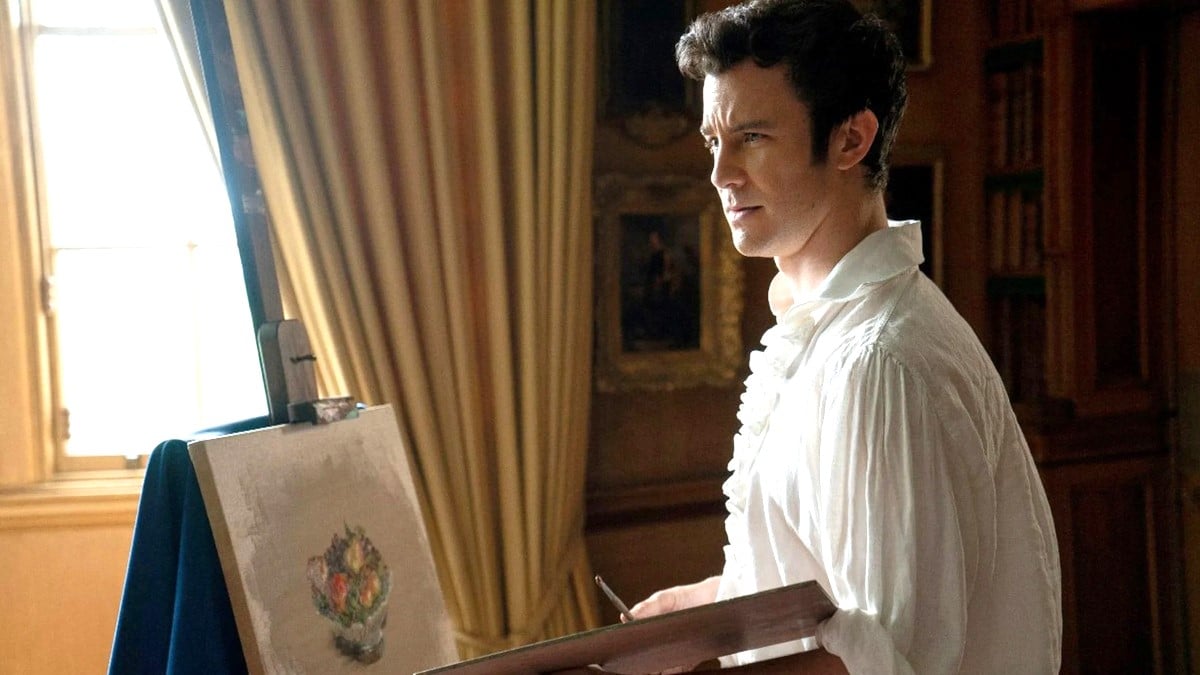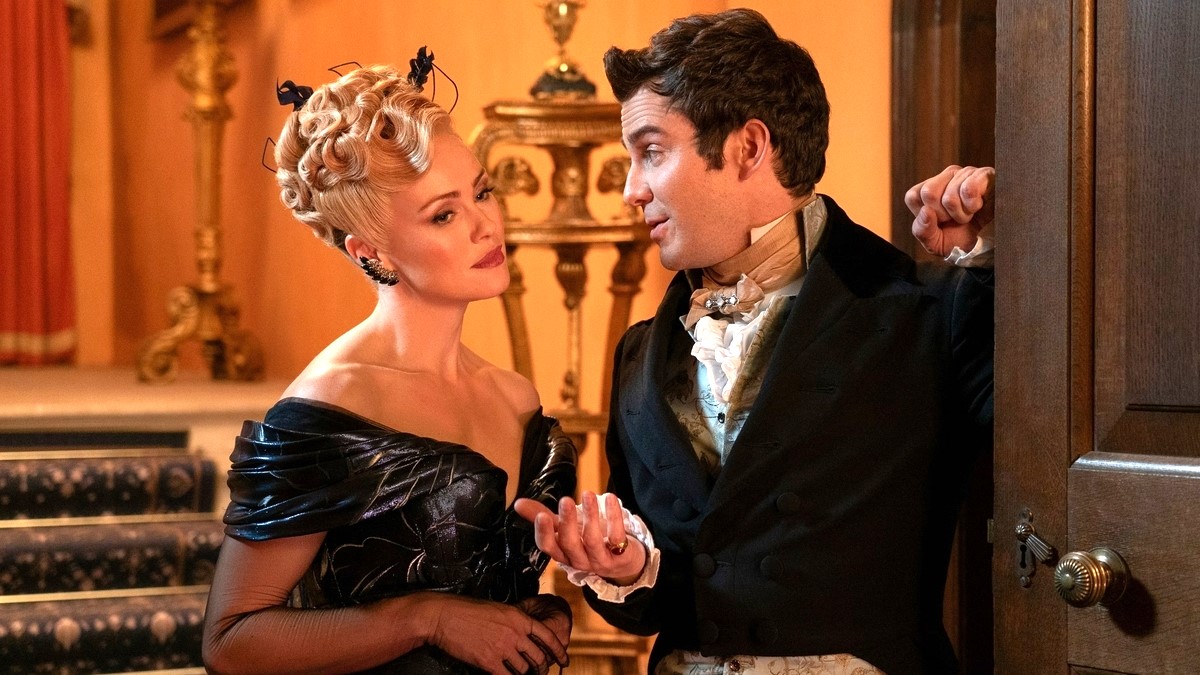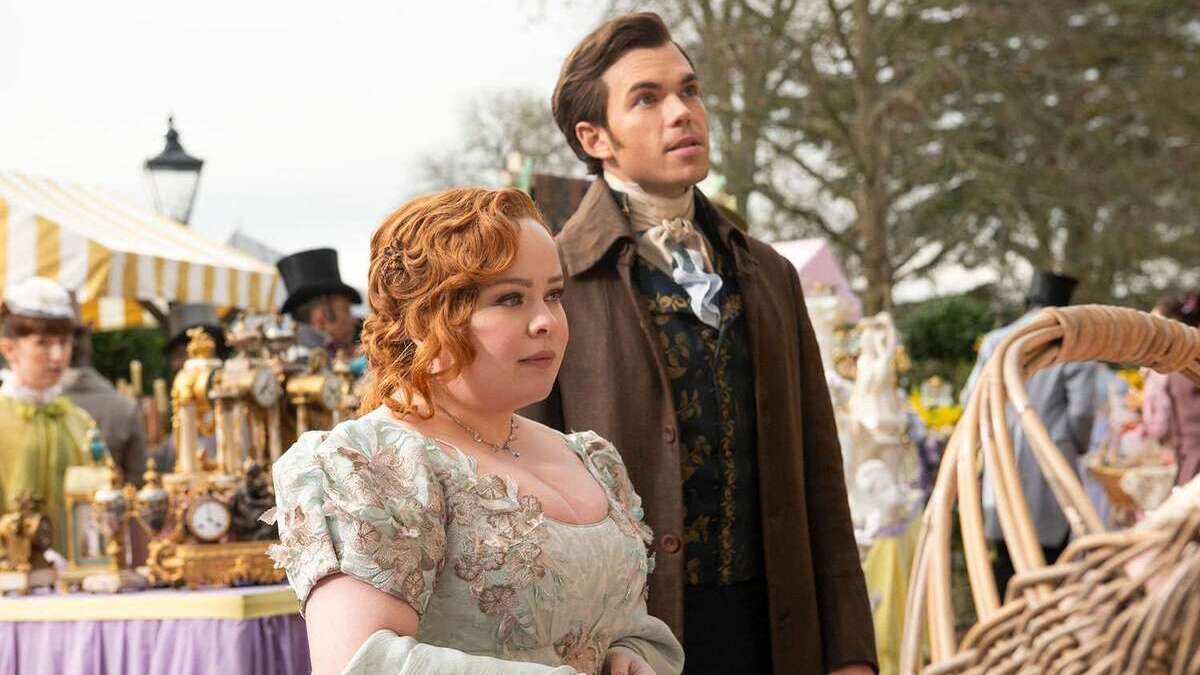If one were to stand still for just a moment, they may feel the air pressure twinge ever-so-slightly. That, gentle readers, is the shuffling of the Netflix television rankings.
Indeed, if Baby Reindeer was ever going to see its throne challenged, it was always going to be at the hand of round three of Chris Van Dusen’s flagship romance series Bridgerton, which has been breaking records, capturing attention, and both breaking and capturing hearts ever since season one premiered back on Christmas Day of 2020.
That season remained uneclipsed by the subsequent second season, as it does by the first batch of episodes of this third season. Nevertheless, season three of Bridgerton has kicked things off in its business-as-usual crowd-pleasing form, with intelligent writing by the carriageful. Some may find the busyness of it all to be ever-so-slightly unwieldy, but episodes one through four ultimately boast a measured handling of the spotlight, punctuated by a cliffhanger that’s far more than meets the eye.
On this season of Bridgerton, Colin (Luke Newton, whose soft-yet-powerful presence hasn’t dwindled a bit, especially as he navigates a much more rounded version of his character this time) is the eponymous family member of focus, having returned to the ton after another spell of traveling, and overflowing with charisma as what can only be the result of self-discovery. It’s Penelope Featherington, however, who’s the true protagonist of this chapter; desperate to escape her insufferable family, she makes it her mission to find a husband this season, only to hit something of a wall in her endeavor. She ultimately enlists the help of Colin, and thus begins the third act of what has been the single most drawn-out slow burn romance in all of Bridgerton.

This statement should be painstakingly self-evident by now, as it should have been for years, but Nicola Coughlan’s Penelope has always been and continues to be one of the best possible protagonists that has ever tangoed in the ton, but now that she’s well and truly the star of the show as of season three, that statement should be fundamentally axiomatic. It’s no great surprise that Coughlan is navigating the character with the grace, charm, quick-wittedness, and vulnerability that she always has, but never has she gotten a chance to flourish to quite the extent that season three has allowed her thus far; it’s magnificent to watch.
It is also through Penelope in which all of season three’s most deftly-crafted thematic and dramatic beats pivot around; the way in which her desire to marry juxtaposes with the reasons that her mother, Lady Featherington (who Polly Walker reignites with all the scorchingly vapid, venomous desperation that she always does), wants Penelope to marry, makes for an absolutely splendid dynamic, and the tension that bubbles up on account of Colin’s disdain for Lady Whistledown (in front of the in-the-know Eloise no less, who’s experiencing her own friction with Penelope) is the sort of lightning that promises to strike twice, in a manner of speaking. From here, the onion of Bridgerton‘s musings on love—the always-esoteric, occasionally-utilitarian bastard that it can so tragically be—begins to unpeel.
Speaking of which, there’s the matter of Hannah Dodd’s Francesca, a mantle passed to her by Ruby Stokes, and who makes her societal debut in season three. The third-oldest Bridgerton sister isn’t quite as magnetic as Daphne, nor as gleefully sharp as Eloise, but there’s nevertheless a singular mystery to Francesca that could have very well pulled the season along all on its own. Indeed, there’s an understated surety to her attitudes on love that will give viewers plenty to think about her in own right, and the idiosyncratic connection she forms with one John Stirling (played by newcomer Victor Alli, who brings a sort of raw charm that will earn him many fans) is one of the sweeter romances in the whole of the show; a refreshing departure from the albeit necessary intensity that has rooted itself in so many of the pairings that have come before. Netflix would be wise to see to it that Dodd’s elusive flair takes center-stage for the already-confirmed season four, especially if she and John are still doing their dance by the end of the season.
Also of note is the deeper, more personal dive into the character of Cressida Cowper, the highs and lows with which Will Mondrich and his family enter society and subsequently regard the life they once lived and the life they now have, and manner in which Benedict’s tongue-in-cheek attitude seems to be toned down this season. Cressida’s sympathetic edge and the new perspective on society offered by Will make for some wonderfully cerebral moving parts, but the handling of Benedict is one of the show’s sorer points; it’s true that he’s overdue for a more meaningful arc, and the addition of Hannah New as his new love interest Tilley Arnold may yet prove to be what the doctor ordered, but for now, it’s glaringly apparent that Luke Thompson’s mischievous, giggly, yet stoic Bridgerton brother is at his best when he gets to be exactly that, and he just hasn’t been given the space to do that here, it seems.

Warning: Spoilers for Bridgerton season three, part one to follow.
But if there’s one compliment that even the most crabby of Bridgerton doubters must give the show, and particularly the closing moments of the first half of the third season, it’s that it has its audience on the tightest possible leash, and knows exactly how to sculpt tension at every level of engagement. As Colin pops the question with all the genial impatience that we ourselves would ask Penelope, the screen cuts to black before she’s able to steady her breathing long enough to finish the exchange.
The brilliance of this ending has to do with its density; first, you have the endorphin hit of Colin finally asking Penelope to marry him; secondly, you have the nauseatingly distressing cliffhanger of whether Penelope will say yes or not (even if that answer seems to be written the stars); and lastly, you have the dread with which so many viewers will realize that there are still four more episodes left. In other words, there’s plenty of time for Colin to learn that Penelope is actually Lady Whistledown, who he’s none too fond of, to put it lightly.
And really, what else did the first four episodes of Bridgerton‘s third season need to do other than craft yet another web of gossip and drama against a delightfully gameified Regency backdrop, begin unfolding its ideas in a few new ways, and leave its viewers screaming the most mercurial scream as the wait for mid-June begins?
The answer is nothing, and that’s exactly the sort of confident start from Bridgerton‘s third round that we were all expecting, and that’s exactly what it delivered.
Good
The whole of it isn't as in top form as the inaugural season, but Nicola Coughlan has firmly established Penelope as the show's best leading lady to date, and sets the pace for most all of its unique triumphs, as well as those to come.
Bridgerton

